Iran condemns US attack on nuclear sites as ‘grave violation’ of UN Charter
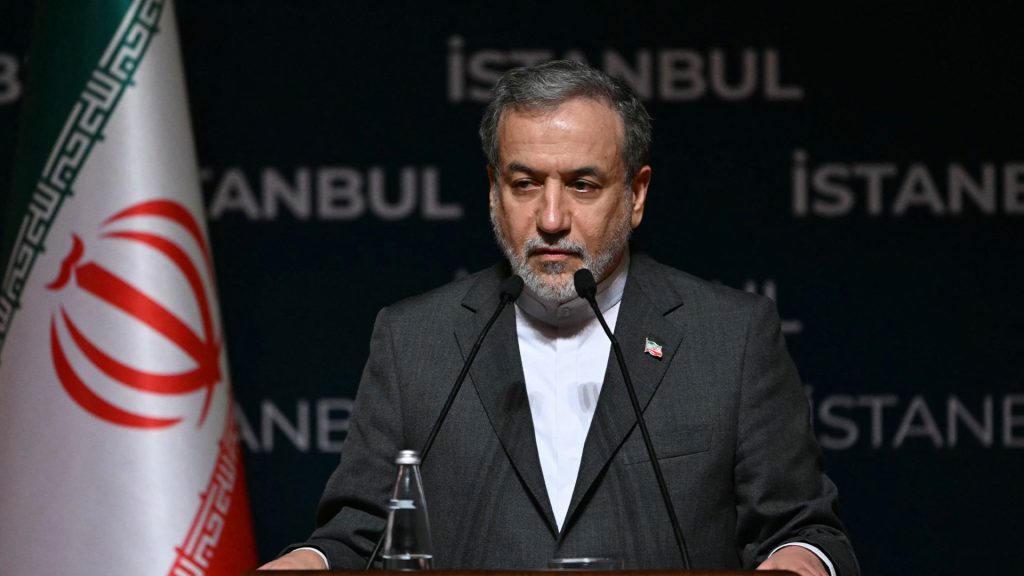
NewsFeed Iran’s Foreign Minister Abbas Araghchi has condemned the US military attack on Iran’s nuclear facilities, calling it an ‘outrageous, grave and unprecedented violation’ of international law. He accused the Trump administration of colluding with Israel to breach Iran’s sovereignty, and vowed Tehran would defend its territory ‘by all means necessary.’ Published On 22 Jun 202522 Jun 2025 Adblock test (Why?)
Freed Mahmoud Khalil vows to keep speaking up for Palestine after release
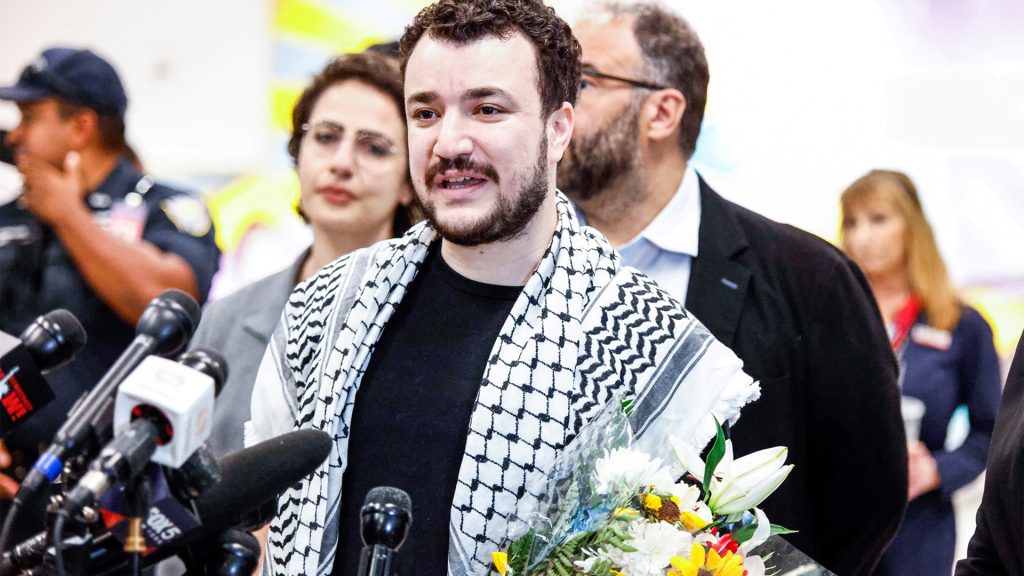
NewsFeed See the moment former Columbia University student Mahmoud Khalil, who was held for 100 days in a US detention centre, was greeted by supporters after his release from custody. Khalil vowed to continue protesting US complicity in Israel’s genocide against Palestinians in Gaza. Published On 22 Jun 202522 Jun 2025 Adblock test (Why?)
Mahmoud Khalil vows to continue to ‘speak up for Palestine’ after release
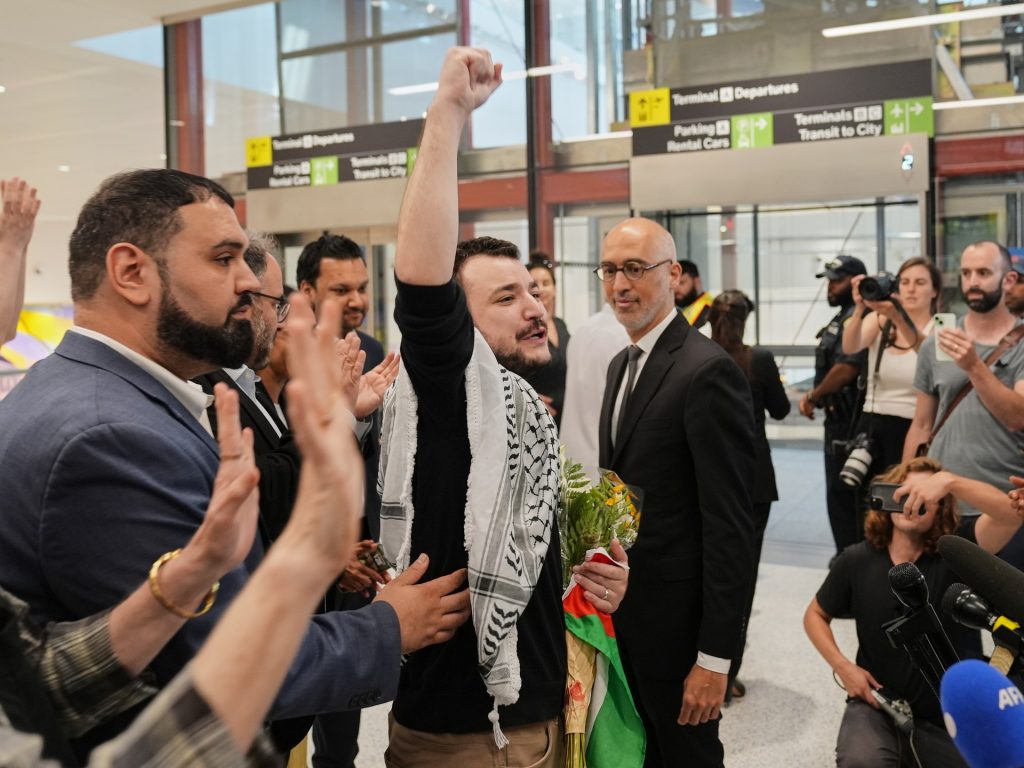
Former Columbia University student was released from a detention centre on Friday after being held for more than three months. Former Columbia University student Mahmoud Khalil has pledged to continue protesting Israel’s war on Gaza, as well as the United States’s support for Israel’s military operations. Khalil, who was released on Friday night after being detained for more than three months at a detention centre, told reporters at New Jersey’s Newark International Airport on Saturday that the government was funding “this [Gaza] genocide, and Columbia University is investing in this genocide”. “This is why I will continue to protest with every one of you. Not only if they threaten me with detention. Even if they would kill me, I would still speak up for Palestine,” he said. “Whether you are a citizen, an immigrant, anyone in this land, you’re not illegal. That doesn’t make you less of a human.” Born in Syria to Palestinian parents, Khalil, 30, was arrested by immigration agents at his university residence in March and swiftly became the image for President Donald Trump’s harsh crackdown on pro-Palestine student protesters and their possible deportation in the name of alleged anti-Semitism. The government has claimed that the grounds to detain and deport Khalil, a legal US citizen, were that there were inaccuracies in his application for permanent residency. But District Judge Michael Farbiarz said it was “highly, highly unusual” for the government to continue detaining a legal US resident who was unlikely to flee and had not been accused of any violence. Under the terms of his release, Khalil is not allowed to leave the country except for “self-deportation” and faces restrictions on where he can go in the US. Advertisement The government condemned the decision to release Khalil and filed a notice that it was appealing the decision. Adblock test (Why?)
What is the cost of the war between Israel and Iran?
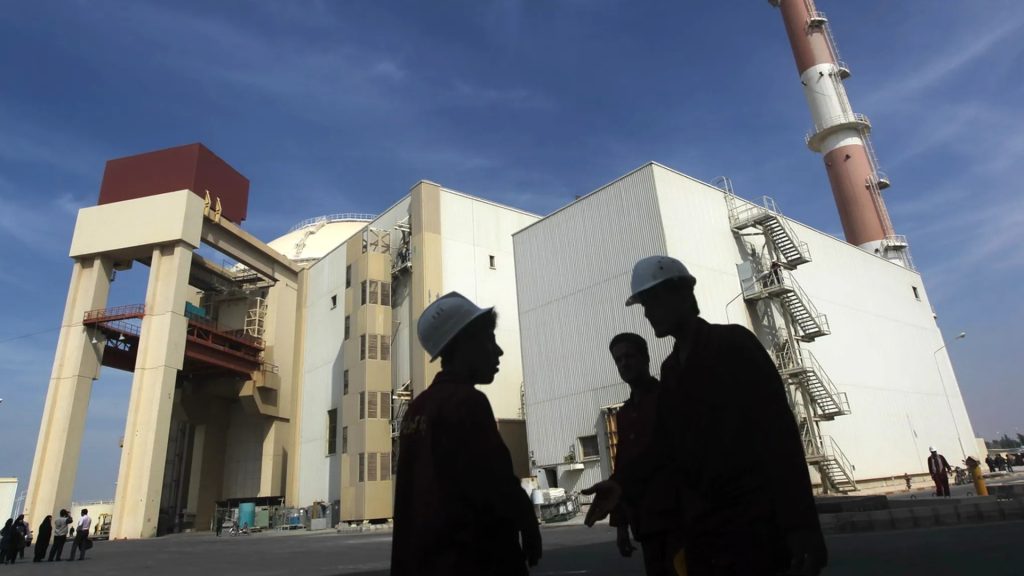
Continuing strikes from both countries are draining their economies. Israel and Iran are in the second week of the conflict. As well as inflicting damage, both countries are putting their economies under strain. Israel has spent billions of dollars on its war on Gaza and has upped its spending considerably with its largely air-based attacks on Iran. Iran was already struggling with the years of sanctions and now its oil and gas facilities are being hit. So can the two nations sustain the conflict? Which is likely to be worst affected? And will the conflict eventually damage the global economy? Presenter: Neave Barker Guests: Aly-Khan Satchu – Geoeconomic analyst and investor Eyal Winter – Professor of economics at the Hebrew University and Lancaster University Nader Habibi – Professor of practice in the economics of the Middle East at Brandeis University Adblock test (Why?)
The Netherlands returns 119 stolen sculptures to Nigeria
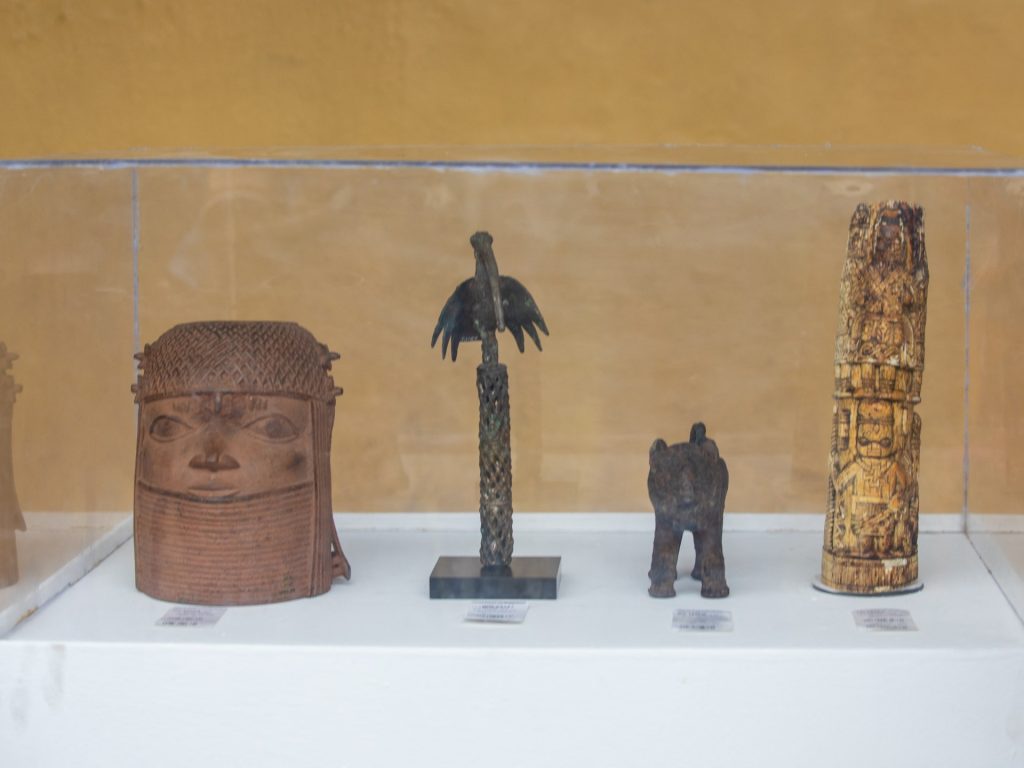
The Benin Bronzes were artefacts stolen during the UK’s imperial plunder of Benin, modern-day southern Nigeria. The Netherlands has officially handed back 119 ancient sculptures stolen from the former Nigerian kingdom of Benin more than 120 years ago during the colonial era. Olugbile Holloway, director-general of Nigeria’s National Commission for Museums and Monuments, said on Saturday that the artefacts were the “embodiments of the spirit and identity of the people from which they were taken from”. “All we ask of the world is to treat us with fairness, dignity and respect,” he said at a ceremony held at the National Museum in Lagos. Holloway added that Germany had also agreed to return more than 1,000 additional pieces. The artefacts, known as the Benin Bronzes, are the latest return of precious history to Africa as pressure increases on Western governments to return items taken during imperialism. Four of the artefacts are on display in the museum’s courtyard and will remain in the museum’s permanent collection, while the others will be returned to the Oba of Benin, Ewuare II – the traditional ruler of the Kingdom of Benin in southern Nigeria. The Benin Bronzes include metal and ivory sculptures dating back to the 16th to 18th centuries. The items were stolen in 1897 when British forces, under the command of Sir Henry Rawson, ransacked the Benin kingdom – modern-day southern Nigeria – and forced Ovonramwen Nogbaisi, the monarch at the time, into a six-month exile. In 2022, Nigeria formally requested the return of hundreds of objects from museums worldwide. In the same year, about 72 objects were returned from a museum in London, and 31 were returned from Rhode Island in the United States. Advertisement Adblock test (Why?)
The woman raising 98 children with disabilities in Uganda
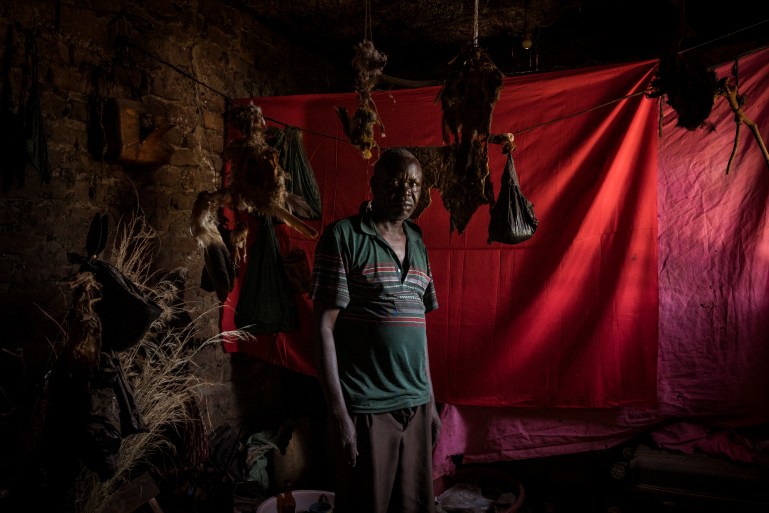
On a humid, late afternoon in November, Edith sits giggling loudly and bantering with two older members of her team during a lull between heavy rain showers. They watch as younger staff members dodge puddles and sweat through a daily aerobics routine in the muddy courtyard. As energetic pop music blares across the compound made up of three single- and double-storey buildings, seven-year-old Diego, who has cerebral palsy, heads up a concrete ramp towards a therapy room. His wrists twisted, he crawls forward slowly until Edith spots him. “Diego, my boy!” the 49-year-old calls out with a wide grin. She runs over to him, her loose dress billowing as she scoops him up and swings him quickly onto her hip. He gives her a high five, and the two laugh before turning their attention to the workout. The warmth and affection between Edith and her staff and the children at the orphanage make the place feel like it belongs to a very large family. Edith’s own journey as a disability rights figure in Uganda began in 2000 with the birth of her first child, Derrick, in Jinja. When Derrick was two days old, he turned yellow and cried excessively. So Edith and her husband, Richard, took him to a hospital where he was misdiagnosed with malaria. For two weeks, their son suffered convulsions, and upon seeing another doctor, he was found to have complications with his spinal cord after contracting meningitis. Witch doctors like Robert Apedu in Soroti District provide 77 percent of health services in rural areas. They offer a more convenient alternative to health facilities and medicines found in cities [Christopher Hopkins/Al Jazeera] “When he made three months, this is when I realised that my son was not growing as a normal child. He had poor head control. He had a curved spinal cord. He was very floppy,” Edith recalls while sitting in her office. Its walls are adorned with certificates of appreciation and merit, and a portrait of President Yoweri Museveni hangs above the door. As she looks out a window onto a playground full of children, Edith recalls how she and Richard struggled to get information about their son’s condition and were ostracised by their friends and family who were fearful of them and Derrick. “We started coming into the hospital, in and out. Home, hospital, home, hospital. And with his situation, especially with convulsions, people were like, ‘He has got epilepsy. He has demons.’ And this is where I was rejected by the community,” she says. “They were like, ‘She gave birth to a demon-possessed child.’” In the village of Omalera, Robert rubs a paste of plant matter and water onto the skin of Noah Oyara, 17, who has no use of his legs and also lives with hydrocephalus. Due to negative connotations surrounding his profession, Robert refers to himself as a ‘traditional healer’ or ‘herbalist’ [Christopher Hopkins/Al Jazeera] Historically and until today, education about disabilities has not been promoted through government-run schools or local clinics, leading many Ugandans to resort to traditional healing. Without a diagnosis and feeling helpless, Edith succumbed to social pressure and took her son to traditional healers. “I tried to take him to different witch doctors. They were cutting him all over the body, smearing him with their herbs, washing him with blood of the chicken, the blood of the goat. They could take us in at night to shower us with the blood of the chicken, but still, Derrick didn’t change,” she recalls. “It was just worsening.” But then an elderly couple at her church encouraged her to return to the hospital and supported her family. So Edith returned with Derrick to the hospital. After 12 months, he was diagnosed with permanent disability. The prolonged lack of treatment for meningitis had led to severe brain damage and cerebral palsy, leaving him nonverbal and unable to walk or feed himself for the rest of his life. Adblock test (Why?)
Russia-Ukraine war: List of key events, day 1,213
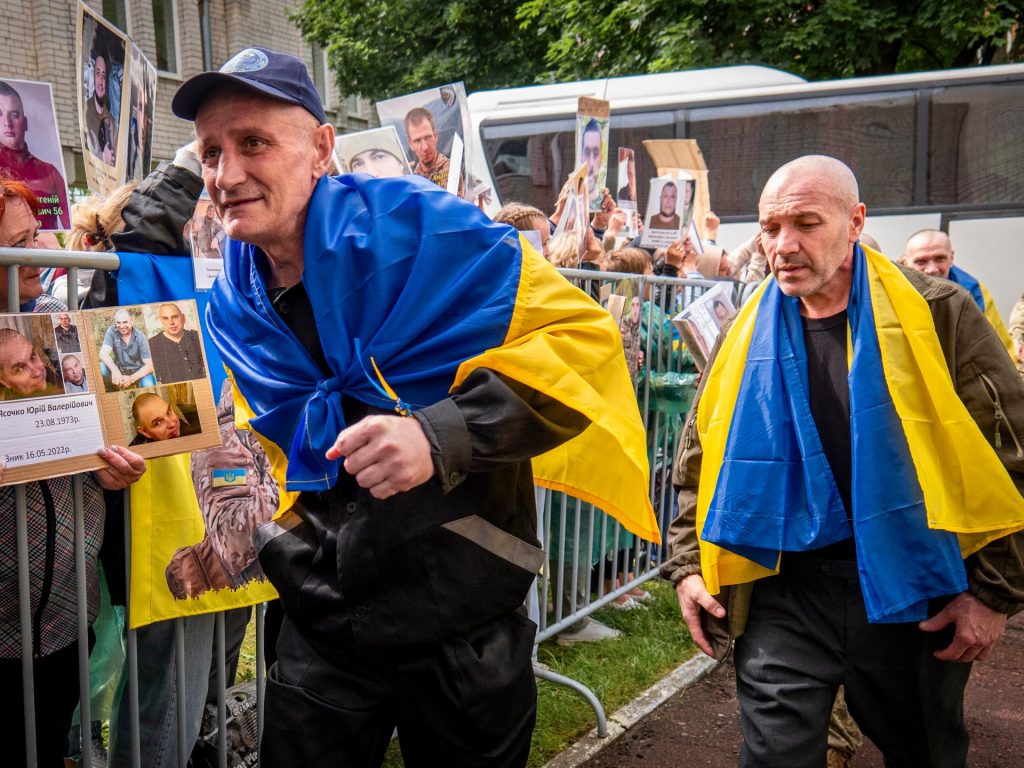
Here are the key events on day 1,213 of Russia’s war on Ukraine. Here is how things stand on Saturday, June 21: Fighting Drones and missiles launched by Russia overnight have damaged energy infrastructure in central Ukraine’s Kremenchuk district in Poltava, said local military authorities. One person was injured in the attack, according to Volodymyr Kohut, the region’s military governor, who did not provide further details on the extent of the damage. Russia had targeted the district’s refinery, according to a report by online news outlet Strana.ua. Politics and diplomacy Ukraine and Russia exchange more prisoners of war, officials from both countries said, the second swap in two days under an agreement struck in Turkiye earlier this month. All the captured soldiers were wounded, ill or under 25 years old. Neither side said how many soldiers had been freed. At Russia’s flagship economic forum in Saint Petersburg, President Vladimir Putin said he did not “rule out” his forces taking control of Ukraine’s northeastern city of Sumy as part of efforts to create a buffer zone along the border. The Sumy region is not one of the regions Moscow has formally annexed, although Russian forces have recently made inroads there for the first time in three years, with Putin claiming his troops had advanced up to 12km (7 miles) in the region. In a string of hawkish remarks, Putin also appeared to repeat his denial of Ukrainian statehood. Ukraine said Putin’s comments showed “disdain” for the peace process. The German military considers Russia to be an “existential risk” to the country and Europe, according to a Spiegel news magazine report that cites a new Bundeswehr strategy paper. Russia is verifiably preparing for a conflict with NATO, particularly by strengthening forces in western Russia “at the borders with NATO,” the report cites the strategy paper as saying. Germany can only counter this threat “with a consistent development of military and society-wide capabilities,” the document concludes. Putin has reaffirmed Moscow’s opposition to the spread of weapons of mass destruction, including any potential acquisition by Iran. Putin told Sky News Arabia that Russia supports Iran’s right to develop nuclear energy for peaceful purposes, emphasising that the International Atomic Energy Agency (IAEA) has found no evidence suggesting Tehran seeks to build nuclear weapons. Putin also stated that Russia is prepared to assist Iran in the development of its civilian nuclear programme. Advertisement Economy At the economic forum in St Petersburg, Putin also urged officials not to let Russia fall into recession “under any circumstances”, as some in his own government warned of a hit to economic growth. Economists have warned for months of a slowdown in the Russian economy, with the country posting just 1.4 percent year-on-year growth in the first quarter of 2025, the weakest pace in two years. A decision by the OPEC+ group of leading global oil producers to speed up production now looks far-sighted and justified amid the Middle East conflict, said Igor Sechin, head of Russia’s largest oil producer Rosneft, at the forum. Sechin also said that there will be no oil glut in the long term despite the production rise, and that the European Union seeks to reduce Russia’s oil cap to $45 to improve the profitability of its purchases, not to cut Russia’s budget revenues. Adblock test (Why?)
Tehran is in shock – and we have fled with heavy hearts
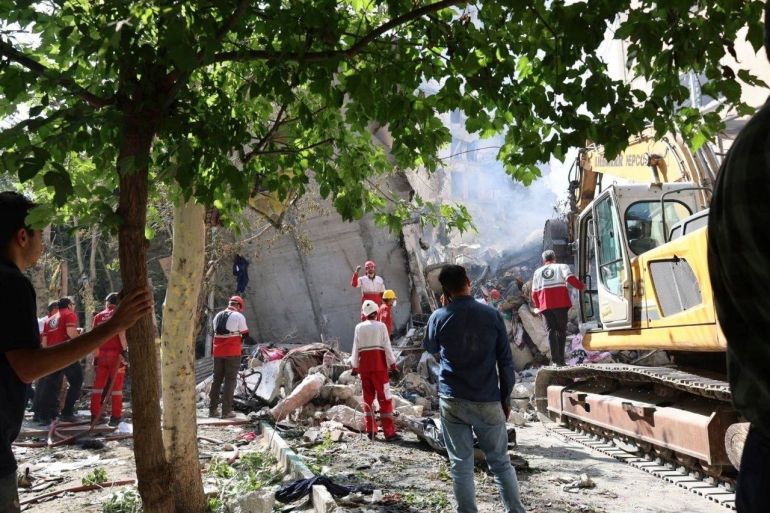
Gilan, Iran – The prospect of war seemed to creep nearer to reality with each passing day, but perhaps few of the millions who have been forced to abandon their homes across Iran in the past week – including myself – could have known this new reality would impose itself so harshly or abruptly. The first explosions jolted people awake in Tehran shortly after 3am on June 13, when a large number of Israeli fighter jets and drones attacked dozens of areas across the country, and explosives-laden quadcopters and anti-fortification Spike guided missiles were launched by Israeli agents from inside Iran. Entire residential buildings were levelled in the capital, military sites and air defence batteries were targeted, and above-ground facilities supporting nuclear enrichment halls buried deep inside mountains in Isfahan province’s Natanz were bombed. Dozens of civilians were killed, as were a large number of top military commanders and nuclear scientists. In this photo released by the Iranian Red Crescent Society, rescuers work at the scene of an explosion after an Israeli strike in Tehran, Iran, on Friday, June 13, 2025 [Iranian Red Crescent Society via AP] Tehran was in shock the first morning after the attacks, as people struggled to process the terrifying news and evaluate their options while the authorities scrambled to mount a concerted response to the surprise hits. As the attacks came on a Friday morning – the last day of the weekend in Iran – most city streets were eerily quiet in the immediate aftermath, except for those where Israeli bombs had made an impact. Soon, however, hours-long queues had formed at almost every single fuel station across the sprawling capital, which has a population of nearly 10 million people and holds more than 15 million during busy workdays, as millions also commute from neighbouring cities like Karaj. Advertisement I went out to visit a few of the targeted sites in western Tehran: Multiple homes had been destroyed in the Patrice Lumumba neighbourhood, several floors of a 15-storey building providing accommodation for university professors had caved in at Saadat Abad and adjacent buildings were damaged, while the top two floors of another residential building had been completely wiped out in Marzdaran. All were successful targeted assassinations – including of several top nuclear scientists – and many civilians were also killed. Debris from an apartment building is seen on top of parked cars after a strike in Tehran, Iran, early on Friday, June 13, 2025 [Vahid Salemi/AP] Later that night, Iran’s armed forces began launching hundreds of missiles and drones at Israel in retaliation. Nearly one week on, at least 16 rounds of Iranian strikes have been launched, with no immediate end in sight as Tehran says it will continue to hit back so long as Israel is attacking. Meanwhile, United States President Donald Trump teases triggering an all-out regional war by directly entering the war alongside Israel, which he and Washington’s Western allies already support with cutting-edge munitions, a massive fleet of refuelling planes and intelligence efforts. For the next few days, the Israeli attacks were ringing out across Tehran and the country during the daytime, terrorising civilians who saw the smoke and heard the explosions get closer to their homes or places of work. Both at home and at Al Jazeera’s Tehran bureau, I heard many explosive impacts, with some of the closer ones only about 2km (1.2 miles) away. Most of Tehran was shut down after the Israeli attacks ramped up, and the streets and petrol stations were more crowded than ever after Israel and Trump told people to evacuate immediately. The government said metro stations and mosques were opened as 24-hour shelters since it has built no dedicated shelters or come up with any clear security protocols, despite the ever-present threat of war. Red Crescent Society rescuers work at the scene of an explosion following an Israeli strike in Tehran, Iran, on Friday, June 13, 2025 [Iranian Red Crescent Society via AP] On Monday, after three days of evaluating the situation, my family and I decided to join the countless others who had already fled Tehran. After hurriedly packing some clothes and a few belongings in a suitcase, I drove from my own place to my girlfriend’s house to pick her up at about 4pm. Her parents, who work in healthcare, needed to stay in Tehran that day but they have since left as well, after Israeli air strikes intensified in their neighbourhood. We then picked up my mother – along with our four cats who have been staying with her – from her home in western Tehran, close to a major road which exits the capital. Israeli bombs were falling on multiple areas across western Tehran as we scurried to grab the cats and put them in their boxes. Advertisement The unmistakable sounds of the explosions, which leave a sickening, sinking sensation in your stomach no matter how many times you hear them, only added to the urgency – especially since the Israeli military had issued a new evacuation threat at about the same time and then bombed the state television headquarters. Smoke rises from the building of Iran’s state-run television channel after an Israeli strike in Tehran, Iran, on Monday, June 16, 2025 [AP] Fleeing north We left Tehran with heavy hearts, not knowing when we might return. The buildings were already mostly empty of residents. The feeling that we may not return to the same intact neighbourhoods was unavoidable, as was the terror we feel for those who wanted to leave but could not, whether because they are nursing a sick family member or because they simply lacked the means to do so. Iran’s ailing economy has been dragged under the weight of years of local mismanagement and US sanctions. The journey north, which usually takes about four hours, took close to 12. The highways were a sea of vehicles filled with families, pets and belongings. Roadside diners and service areas brimmed with people who had no idea
Israel-Iran conflict: List of key events, June 20, 2025
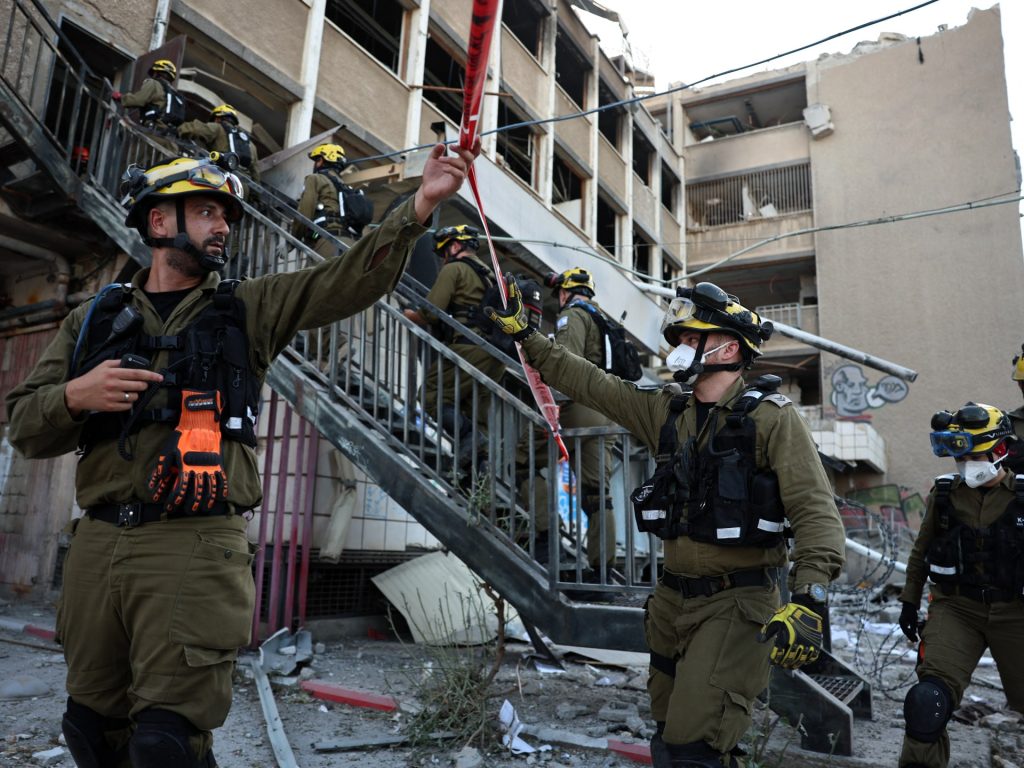
Here are the key events on day eight of the Israel-Iran conflict. Here’s where things stand on Friday, June 20: Fighting Israel said on Friday that it had struck dozens of military targets in Iran overnight, including Tehran’s Organisation of Defensive Innovation and Research, missile production sites and military facilities in western and central Iran. The Israeli military said it struck surface-to-air missile batteries in western Iran, killing a squad of Iranian soldiers on the move during the operation, including a commander of an Islamic Revolutionary Guard Corps (IRGC) base. Israeli Defence Minister Israel Katz said he had instructed the military to intensify attacks on “symbols of the regime” and “mechanisms of oppression” in the Iranian capital, Tehran, aiming to destabilise it. Air defence systems were activated in Bushehr in southern Iran, the location of the country’s only operating nuclear power plant, according to the Young Journalists Club, cited by state broadcaster IRIB. Iran’s IRGC said it had fired its 17th wave of missiles at Israeli military facilities, including the Nevatim and Hatzerim bases. Iran fired missiles at Beersheba in southern Israel, with initial Israeli media reports also pointing to missile impacts in Tel Aviv, the Negev and Haifa. Iran said that the “precise hits” demonstrated “our offensive missile power is growing”. The Fars news agency quoted an Iranian military spokesperson as saying Tehran’s missile and drone attacks on Friday had used long-range and ultra-heavy missiles against Israeli military sites, defence industries and command and control centres. Advertisement Casualties and disruptions Israel’s attack on Tehran’s Organisation of Defensive Innovation and Research, which it says is involved in Iran’s alleged nuclear weapons development, killed a nuclear scientist, according to Israeli media reports. Iranian media reported that an industrial plant involved in the production of carbon fibre in northern Iran was damaged in an attack. Iran’s health ministry said a third hospital in Tehran had been struck by Israeli bombs, according to state news agency IRNA. At least five people were injured when Israel hit a five-storey building in Tehran housing a bakery and a hairdresser’s, Fars news agency reported. Iranian news outlet Asriran said that a drone attacked an apartment in a residential building in the Iranian capital’s central Gisha district. The Human Rights Activists News Agency, a US-based human rights organisation that tracks Iran, said that Israeli air attacks have killed 639 people in the country. Israeli authorities had previously said 24 civilians had been killed in Iranian attacks. Israel’s Magen David Adom rescue service said its teams were providing treatment to 17 people, three in serious condition, after Iran’s strikes. Israeli railway officials told local media that, due to the Iranian missile strike on Beersheba, the city’s north station was temporarily closed. Afghanistan’s agriculture minister said his country was in discussions with Russia to import certain foodstuffs as the conflict between Israel and Iran, one of its largest trading partners, risked cutting off supplies. Protests Tens of thousands of people attended anti-Israel protest marches in Tehran, as well as other major Iranian cities, including Isfahan, Shiraz, Mashhad and Qom. Demonstrators in southern Beirut, Lebanon held a pro-Iran rally after Friday prayers. Thousands of Iraqis gathered for Friday prayers in Baghdad’s Sadr City, a suburb with a large Shia population, chanting against the US and Israel amid the attacks on Iran. Pro-Palestinian activists in the UK broke into the Royal Air Force Brize Norton base in Oxfordshire and damaged two aircraft. Politics US President Donald Trump told reporters on Friday that his director of national intelligence, Tulsi Gabbard, was wrong to suggest there is no evidence Iran is building a nuclear weapon. “Well, my intelligence community is wrong,” he replied when asked about Gabbard’s position. Trump also said that while he “might” support a ceasefire deal between Israel and Iran, “Israel’s doing well in terms of war, and I think you would say that Iran is doing less well”. Iranian President Masoud Pezeshkian said the only way to end the conflict was for Israel to stop its air attacks, warning that “failure to do so would result in a far more forceful and regrettable response from Iran”. Russian President Vladimir Putin said in St Petersburg that Moscow was sharing ideas with “our Israeli and Iranian friends” about how to end the bloodshed and said he believed there was a diplomatic solution. US Treasury Secretary Scott Bessent announced new Iran-related sanctions aiming to disrupt Tehran’s efforts to “procure the sensitive, dual-use technology, components, and machinery that underpin the regime’s ballistic missile, unmanned aerial vehicle, and asymmetric weapons programs”. Qatari Prime Minister Sheikh Mohammed bin Abdulrahman Al Thani said in a phone conversation with Norway’s Foreign Minister Espen Barth Eide that Israel targeting economic facilities in Iran could lead to catastrophic regional and international repercussions. French President Emmanuel Macron said there was “no justification” for strikes on civilians and on civilian infrastructure in the weeklong conflict, adding that Tehran should show its willingness to return to the negotiating table concerning its nuclear programme. Kremlin spokesperson Dmitry Peskov said in comments carried by state news agency TASS that potential use of tactical nuclear weapons by the US in Iran would be a catastrophic development. German Chancellor Friedrich Merz and Turkish President Recep Tayyip Erdogan discussed the ongoing conflict between Israel and Iran over a phone call, a German government spokesperson said. UK Foreign Secretary David Lammy said his country was working with Israeli authorities to arrange charter flights for British nationals from Tel Aviv when Ben Gurion International Airport reopens. Advertisement Diplomacy The United Nations Security Council met at its headquarters in New York to discuss the situation between Iran and Israel. Rafael Grossi, director of the International Agency for Atomic Energy, warned against attacks on nuclear facilities at the meeting, saying a strike on the Bushehr nuclear plant could cause “radioactive releases with great consequences” beyond Iran’s borders. He called for “maximum restraint”. UN Secretary-General Antonio Guterres said at the meeting that expansion of the Israel-Iran conflict could “ignite a fire no one can control”,
Israeli and Iranian diplomats clash at UN meeting over conflict
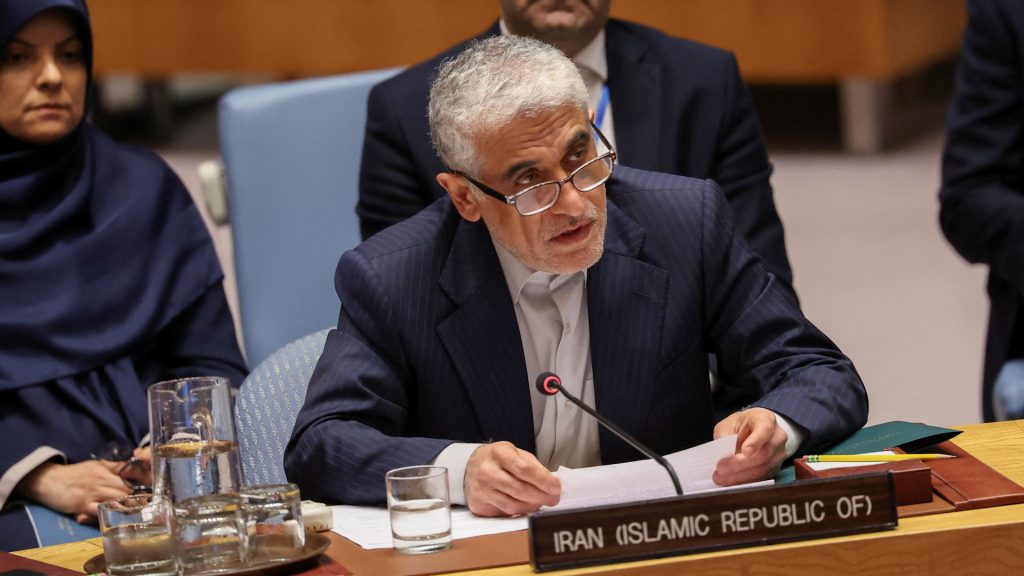
NewsFeed “You’re a wolf pretending to be a diplomat” Iranian and Israeli officials clashed during a heated UN Security Council session. Iran said it would continue to defend itself until Israeli attacks end, while Israel vowed to keep striking until Iran’s “nuclear threat” is dismantled. Published On 20 Jun 202520 Jun 2025 Adblock test (Why?)

